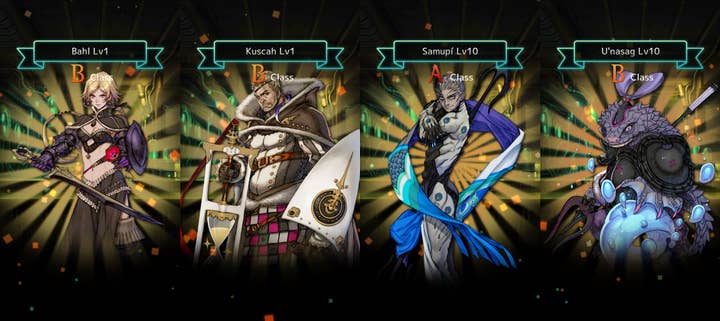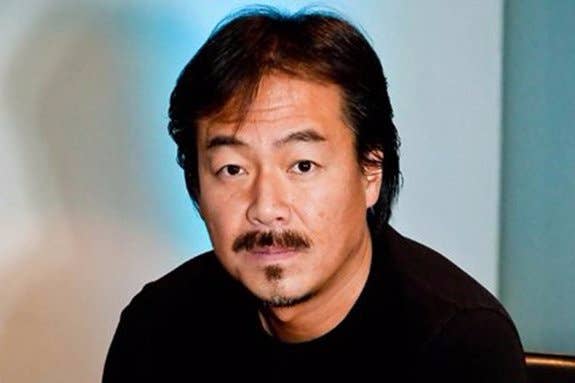Broadcasting is Sakaguchi's next Fantasy
Final Fantasy creator's new Tokyo studio will explore new ways to connect with gamers through online streaming and broadcasting
Hironobu Sakaguchi isn't at the meeting room where he's scheduled to hold interviews. This fact is causing the mostly volunteer staff of BitSummit considerable consternation. When we finally locate someone who knows where he is, it transpires that rather than tucking himself away in a private interview room, he's gone out to sit at the small table where his studio, Mistwalker, is selling t-shirts and merchandise from its popular mobile RPG, Terra Battle. We find him there signing autographs and taking selfies with fans, many of whom seem stunned that it's the affable creator of Final Fantasy himself who's manning the merchandise stall.
It is a little bit jarring to see a man so widely regarded as a game development legend hawking t-shirts - in his on-stage session at the event earlier in the day, he'd started out by encouraging fans to drop by and buy a shirt or an art print - but Sakaguchi clearly doesn't have any problem with playing vendor at the event. On the contrary, he's quite obviously enjoying chatting with fans and posing for photos, and continues signing autographs and shaking hands with fans even while we talk.
"I think broadcasting is a real opportunity to broaden and expand the world of our games... When you add a broadcast element, you're extending a part of [the experience] out into the real world"
Sakaguchi's pleasure in meeting and interacting with fans isn't confined to an event like BitSummit; as we speak, it becomes clear that the veteran developer is enjoying the newfound closeness between game creators and game players in many ways. "I think broadcasting and streaming are really changing things," he says. "It's creating a really interesting trend for creators. We do live broadcasts from Mistwalker, and our users also do their own streams or get involved in ours. The distance between us and our users has definitely shrunk."
Indeed, in his on-stage presentation, Sakaguchi spoke a lot about Mistwalker's live broadcasts on YouTube and NicoNico, which he hosts personally alongside a rotating cast of Mistwalker staff and other guests. They've become popular among the studio's fans for a number of reasons - not least the regular presence of lots of wine, which can be the root of some unintentional comedy (including an incident when a slightly drunken press of an alarm button resulted in the accidental summoning of the fire brigade to the offices). "We've built a studio for broadcasting in the Mistwalker offices," Sakaguchi confirms, "but the guests bring the wine!"
Inspired by the ability to connect directly with Mistwalker's fans, Sakaguchi is now thinking about new ways to integrate broadcasting into game development, and into games themselves. "The whole process is interesting - we do everything ourselves for our broadcasts, the technical parts as well. I think broadcasting is a real opportunity to broaden and expand the world of our games. Right now, you have a game world, you have users who are enjoying playing in that world and creators building new content for it - but it's all happening in here [he taps a smartphone on the table], inside that world. When you add a broadcast element, you're extending a part of that out into the real world."
Broadcasting has brought Sakaguchi closer to the players of his games, but he sees this as merely the first step. "Thinking about the games we create, I definitely want to include functions that give us and the players more opportunities to communicate. I think that should be built into the game itself - I think that if we can create a connection between users and creators, that'll be really exciting for both sides."
Putting that idea into practice is the focus of the new studio Sakaguchi is starting in Tokyo. "It's a subsidiary of Mistwalker, focused on broadcasting," he explains. "I want to try making a game that's aimed at broadcasting and streaming. I don't know how exactly that will work, in concrete terms - we're just getting started with exploring it - but it's the idea I'm most interested in at the moment... There's a real chance here to broaden the world of the game."
If broadcasting is where Sakaguchi sees his future, if not the future of gaming as a whole, mobile is undoubtedly his present. Launched around 18 months ago, Terra Battle has been a successful first major effort in the mobile space for Mistwalker, which had previously focused on collaborating with other studios to create large, epic RPGs for consoles. Though Terra Battle will eventually come to consoles as well (through another collaborative effort), Sakaguchi clearly has a lot of affection for mobile development, comparing it to his experiences working on the early Final Fantasy titles.

"I like working on both types of game [mobile and console], but what's fun about mobile is that the team sizes are so small - just like when I started working on Final Fantasy," he says. "You can do so much even by yourself. Also, compared to modern game systems, mobile hardware is cheap, but when you think about it, in the past you had these fantastic arcade game systems and cheap hardware like the Famicom, so we got used to making games like Final Fantasy within the limitations of cheap hardware."
Not everything about working on a mobile title was familiar, of course, but Sakaguchi welcomes some of the challenges of the format - especially the need to continue development of a game long after its initial launch. "The creation and update process continues indefinitely, but that's actually fun. It's difficult, but it's a fun process. When I think about the games I made in the past, I think if I was making them now, I'd want to keep updating them - adding dungeons, doubling the size of the narrative over a couple of years... Of course, we couldn't do that back then, but it's really interesting to be able to do it now."
"When I was making Final Fantasy, I was criticised by people who thought it was a bad influence on children... I've been criticised non-stop for more than thirty years now!"
Sakaguchi refers often to the era of the early Final Fantasy games when he talks, but far from being simple nostalgia for glory days, he's adamant that the team sizes and scope of games in that era were ideal for him. When I ask him if he'd like to be involved again in something like the enormous, sprawling development project that's birthed the upcoming Final Fantasy XV, he pauses momentarily. "Well, maybe if something like that became a possibility, but to be honest, that kind of project is really tough. It's very difficult. Right now, the things I'm doing are a lot of fun." He is full of praise for Final Fantasy XV itself, though, telling the BitSummit audience that its prequel movie, Kingsglaive (which came out on the first day of the event) is great, and encouraging them to go and see it - a statement which must come with some strong emotions for Sakaguchi, whose career at Square was effectively ended by the failure of his own movie project, The Spirits Within.
Sakaguchi's time working on Final Fantasy may be long behind him, but it's left him with a wealth of experiences and insights - not to mention a thick skin. When I ask him if he ever worried about criticism of Terra Battle's free-to-play business model, he shrugs expansively. "When I was making Final Fantasy, I was criticised by people who thought it was a bad influence on children. Videogames are always being criticised," he says. "I do listen to what people say, but it's not like there's a requirement to stop making something just because you're being criticised. I've been criticised non-stop for more than thirty years now!"
With that, Sakaguchi turns back to his fans - so many of whom are now lined up for their moment with him that the event staff have started marshalling the queue. If Sakaguchi's ambitious broadcasting plans come to fruition, perhaps soon these fans will have entirely new ways to connect with the man who defined the JRPG and with the worlds he creates.

